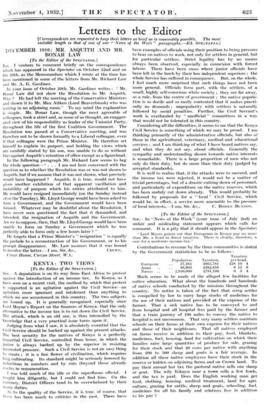Letters to the Editor
[Correspondents are requested to keep their letters as brief as is reasonably possible. The most suitable length is that of one. of our h‘ News of the Week" paragraphs.—Ed. ScEerKroa.1 DECEMBER 1916: MR. ASQUITH " AND MR. BONAR LAW [To the Editor of the SPECTATOR.]
- I venture to comment briefly on the correspondence which has appeared in the Spectator on October 22nd and on the 29th, as the Memorandum which I wrote at the time has been mentioned in some of the fetters from Mr. Richard Law and Mr. A. C. Gardiner. . . . . .
In your issue of October .29th, Mr. Gardiner writes : " Mr. Bonar Law did not show the Resolution to Mr. Asquith-. 1Vby ? He had left the meeting of the Conservative Ministers and shown it to Mr. Max Aitken (Lord Beaverbrook) who was waiting in an adjoining .room." To my mind the explanation is simple. Mr. Bonar Law, though the most agreeable of colleagues, took a strict and, as some of us thought, an exagger- ated view .of his responsibility as leader of the Unionist Party, throughout the life of the first Coalition Government. The Resolution was passed at a Conservative meeting, and was therefore not to be shown formally to a Liberal colleague, even if that colleague were the Prime Minister. He therefore set himself to explain its purport, and holding the views which are candidly stated by his son, was unable to do so without bias against Asquith's retention of office except as a figurehead.
In the following paragraph Mr. Richard Law seems to beg the whole question—". . . I am not here concerned with the question as to whether the Resolution was or was not shown to Asquith, but if we assume that it was not shown, what precisely would have happened ? Asquith, it is true, would not have given another exhibition of that apparent vacillation and instability of purpose which his critics attributed to him. He would have resigned immediately (on the Sunday instead of on the Tuesday), Mr. Lloyd George would have been asked to form a Government, and the Government would have been formed. Whatever may be doubtful about the Resolution, I have never seen questioned the fact that it demanded, and intended, the resignation of Asquith and the Government. Are we to suppose, then, that Mr. Lloyd George would have been unable to form on Sunday a Government which he Was perfectly able to form only a few hours later ?
He forgets that a Prime Minister's "resignation " is equally the prelude to a reconstruction of his Government, or to his prompt disappearance. Mr. Law assumes that it was bound to involve the latter.—I am, Sir, /ix., CREWE. Crewe House, Curzon Street, W. I.










































 Previous page
Previous page